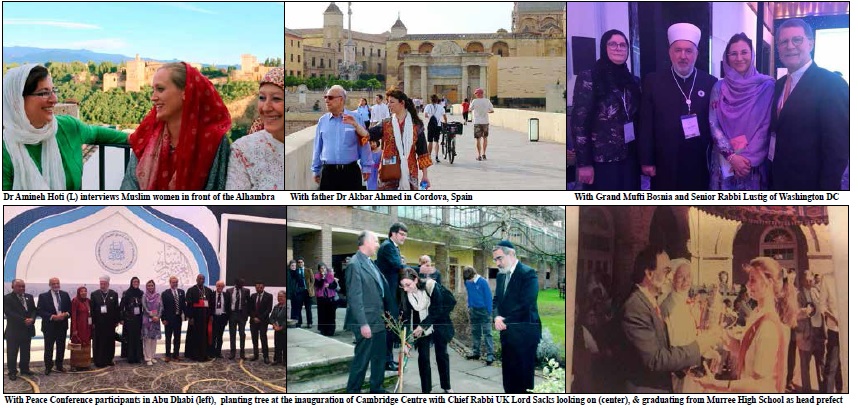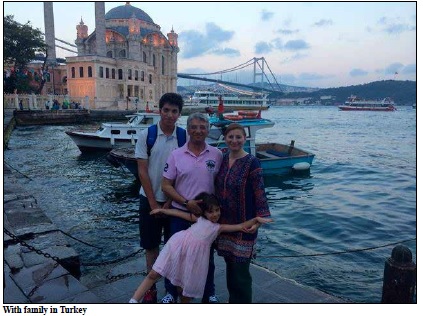DrAminehHoti, Ilm Seeker
By Dr Akbar Ahmed

At a recent top-level conference in Washington, DC, after I gave my keynote address two sweet old ladies came up to where Zeenat my wife and I were standing and said, “That was good, but you must meet and learn from this young Muslim female scholar at Cambridge” who writes about and practices building bridges between religions and cultures.
“Who are you referring to?” I asked with a smile, as I already knew the answer. “Someone called Hoti,” they said tentatively. “DrAminehHoti,” we said proudly, “is our daughter.”
Amineh has brought great joy to us and is a role model for her marvelous siblings, and many others besides. Her birth was especially auspicious and we called her our “miracle child.” I had been invited as chief guest by her Murree school for the annual “passing out” event. Imagine my joy when I presented Amineh a cup as head prefect and then heard her speak on behalf of the school. Both Zeenat and I were thrilled as Zeenat had been given the cup as the head girl when she was at the same school.
As I served over the years in different posts in Pakistan and also at universities in the UK and US, Amineh traveled with me. Amineh graduated from the London School of Economics and afterward married Arsallah Khan Hoti and had children of her own. In spite of being a housewife, mother of two small children and teacher, she decided to study for her PhD in anthropology at the University of Cambridge and conducted fieldwork among Pukhtun women in Pakistan.
Amineh faced the frustration and discouragement from her own society with patience and courage. During the difficult PhD period, Amineh would joke with me, “Why can’t you be a typical South Asian father and tell me to stay home and cook?” But I would tell her to please finish the PhD and that this is all I would ever ask of her. Doing so would be following the Islamic compulsion to seek ilm or knowledge and promote peace.
Imagine our joy when she successfully completed the PhD (published by Cambridge University Press in 2006 as Sorrow and Joy Among Muslim Women: The Pukhtuns of Northern Pakistan.) Overcoming the hurdles Amineh was appointed Director of the first Centre for the Study of Muslim-Jewish Relations in Cambridge which she co-founded and which was part of the larger Abrahamic Centre. Prince Hassan of Jordan is among the center’s patrons. As Director of the center, she pioneered new courses and taught them to imams, rabbis, and priests. She is a long-standing associate at the Lucy Cavendish College at Cambridge. In July 2008 The Sunday Times published a special feature with pictures called “Relative Values: Akbar Ahmed and his daughter Amineh.”
In 2010, Amineh moved back to Pakistan. She has an affinity with the KP province because her mother is the granddaughter of the former Wali of Swat and husband is from Mardan, but she celebrates the ethnic, religious and gender diversity of Pakistan. She set up the first teaching center for interfaith dialogue in Pakistan at Forman Christian College in Lahore and designed a new course—Ilm, AdabaurInsaaniyat (Knowledge, Mutual Respect and Humanity). She began translating her works like “Valuing Diversity: Towards Mutual Respect and Understanding,” which was distributed to 2,500 of the UK’s 5,000 schools, into Urdu and Pashto for Pakistani schools. She serves in Pakistan as Distinguished Fellow at the Institute of Strategic Studies in Islamabad and is an official advisor to the Council of Islamic Ideology of Pakistan.
Amineh has published widely—recently contributing a chapter to the important new book Pope Francis and Interreligious Dialogue: Religious Thinkers Engage with Recent Papal Initiatives—convened and presented at many international conferences, given peacebuilding presentations to the Pakistan Army and contributed to its Hilal magazine, attended top Islamic conferences in Pakistan and those hosted by the Kings of Saudi Arabia and Spain and the royal family in Abu Dhabi, spoken at the White House, and her interviews and articles are featured extensively in Pakistani and international media.
Amineh has also worked closely with me in my academic work, for example, on my quartet of studies examining the relationship between the West and Islam. For “Journey into Europe,” which studied Islam in Europe, Amineh was the lead researcher for Muslim women on the project which took her across the continent and she drew on these experiences in her peace-building work. She was also associate producer, scriptwriter, and cinematographer on the documentary film, Journey into Europe, launched at the Institute of Strategic Studies by then Director General, now, President Masood Khan.

Amineh is a deeply spiritual scholar and I always learn something new from her. As she researched her new book on Pakistan’s minorities he told me with excitement of the great mystics Bhitt Shah and Bulleh Shah. I am not alone in being inspired by her quest for knowledge and spreading peace. Dr Eileen Kugler, a leading American educationist, edited the book, Innovative Voices in Education; Engaging Diverse Communities, in which she introduced Amineh thus: ”Dr. Hoti’s unwavering commitment and personal peace in her work reminds me of great leaders like Gandhi, Nelson Mandela, and Martin Luther King Jr., I am so privileged to know her.”
Professor Lawrence Rosen of Princeton University noted her work was “brilliant,” and Professor Tamara Sonn, Distinguished Professor at Georgetown University, wrote of her work, “absolutely unique…..” Professor Edward Kessler at Cambridge University and founder of the Woolf Institute wrote of her: ”DrHoti is an outstanding pioneer in the study and teaching of interfaith relations. Her work is crucial in our understanding and in fostering better relations.”
Dr James Shera, the decorated former Mayor of Rugby and prominent Christian Pakistani leader, noted: ”I am most impressed with DrAminehHoti’s work on interfaith harmony. Her commitment to peace and harmony is exemplary and admirable especially being a young female amongst a male-dominated society.”
Muslim leaders and thinkers like the celebrated Khizr Khan have praised her from the heart: “I am so proud of our friendship and your work, courage, and intellect,” wrote the Gold Star father. “I have quietly prayed for your continued success. You are sent to lead us in a more enlightened direction. You are an amazing person.”
Akhtar Faruqui, the chief editor of Pakistan Link, noted: “DrHoti is a phenomenal woman…I was so impressed by all that she has done. People continue to talk about how hard it is to achieve anything as a woman in Pakistan with the constraints that society places, but she has certainly defied them all. I feel very inspired by her.”
Towards the end of his life my father, worried about the disinformation around Islam, asked me to write on Islam and capture its peaceful and compassionate nature. Because of him, I wrote the book Discovering Islam, which became a six-part BBC television series. I am thrilled that the torch of knowledge has been passed on to Amineh for the next generation. She remains the eternal seeker of ilm, forever pursuing knowledge in the path of the Beloved.
( The writer is the Ibn Khaldun Chair of Islamic Studies, School of International Service, American University, Washington, DC, and author of Journey into Europe: Islam, Immigration, and Identity)
-----------------------------------------------------------------------------

